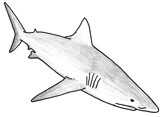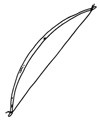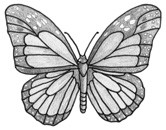
P̈ - p̈
 |
| p̈aheu ‘shark’ |
p̈ahaso [t̼ahaso] ni. biceps; biceps.
▪ O v̈ei-a sohe-na p̈ahaso-m jo sosohoni. ‘Show off your biceps!’ ‘Fais saillir tes biceps !’
► See: lim̈a ‘hand, arm’.
p̈aheu [t̼aheu] n. ~ p̈ahe. shark; requin.
▪ P̈ahe mo har̄i-a sari-ku! ‘My leg got bitten by a shark!’ ‘Je me suis fait mordre la jambe par un requin !’
▪ Hariv mo karu karu karu karu karu, mo lesi-a p̈ahe. ‘And the Rat swam, swam, swam, swam… until he saw a shark.’
◈ Etym. *bakewa.
p̈aisa [t̼aisa] ni. ~ paisa. 1 • [hum] side; [hum] côté, flanc.
▪ Om sarai lo p̈aisa-ku. ‘You are sitting beside me.’ ‘Tu es assis à mon côté.’
2 • side, edge, near to; côté, bord, proximité de.
▪ Viha ri mo r̄uru lo p̈aisa sala. ‘This tree is on the side of the road.’ ‘Cet arbre est dressé sur le bord de la route.’
p̈aivuho [t̼aiβuho] adv. tomorrow; demain.
▪ Nija p̈aivuho! ‘Good bye! [we tomorrow]’. ‘Au revoir ! [nous demain]’.
► See: pongi ‘day’.
► Ant: nanovi.
 |
| p̈aka ‘bow’ |
p̈aka [t̼aka] ni. a bow, to shoot with; arc, arme utilisée au combat ou à la chasse, pour tirer.
▪ P̈aka nene, m̈ar̄a vinavina. ‘This bow is made for shooting arrows.’ ‘Cet arc est fait pour (tirer avec) des flèches.’
▪ No-ku ta, o voro r̄e p̈aka-ku, r̄e vina-ku. ‘Father, make me a bow and some arrows.’ ‘Mon père, fabriquez-moi un arc et des flèches.’
► See: vina ‘arrows’; vi-p̈aka ‘banyan’ ‘banian’.
p̈ala [t̼ala] adp. preposition introducing the object of certain verbs, e.g. m̈ana 'laugh'; de, à cause de. Préposition introduisant les régimes de certains verbes, ex. m̈ana 'rire'.
▪ Om m̈an p̈ala sa r̄o? — P̈ala pilo-m. ‘What were you laughing at/about? — At your bald head!’ ‘De quoi ris-tu? — De ton crâne chauve !’
p̈ap̈a [t̼at̼a] n. fence, esp. surrounding a garden (isa); clôture, enclos, spéc. disposé autour d'un jardin.
p̈ap̈alihono [t̼at̼alihono] n. wild kava; kava sauvage. Macropiper latifolium.
p̈ar̄i [t̼ari] ni. molar tooth (vs. naho hojo 'front teeth'); molaire.
► See: hojo2 ‘tooth’.
◈ Etym. *bati ‘(upper canine) tooth’.
 |
| p̈ep̈e ‘butterfly’ |
p̈enaho [t̼enaho] ni. forehead; front, visage.
► See: naho ‘face’ ‘visage’.
p̈ep̈e [t̼et̼e] n. 1 • butterfly; papillon.
2 • Lined butterflyfish, reef fish, 35 cm; Chaetodon linéolé (angl. Lined butterflyfish), poisson récifal, 35 cm. Chaetodon lineatus.
◈ Etym. *bebe.
p̈ep̈ei [t̼et̼ei] n. k.o. plant, Bisl. Laslas; plante, Bisl. Laslas. Polyscias scutellaria.
p̈eravu [t̼eɾaβu] adj. 1 • long, stretched out horizontally; e.g. a cape (jingo) stretching far out to sea; long, étiré horizontalement, ex. en parlant d'un cap (jingo) très avancé en mer.
▪ Mo v̈a lo r̄av̈al jingo v̈a-su jingo p̈eravu. ‘He reached beyond the cape over there, that headland stretching out to sea.’ ‘Il finit par dépasser le cap là-bas, ce promontoire avancé.’
2 • [hum+] tall, vertically long; grand, long verticalement : partic. en parlant de la taille d'une personne.
► Ant: petepete.
◈ Etym. *baravu ‘long, tall’.
p̈ilahe [t̼ilahe] n. ~ p̈ilahe hurar̄a ‘"Râle de forêt"’. Buff-banded Rail, a long-legged bird, 30 cm; Râle à Bandes, oiseau aux longues pattes, 30 cm. Gallirallus philippensis.
◈ Etym. *bilake ‘Buff-banded Rail’.
p̈ilahe r̄asi [t̼ilahe rasi] n. a bird.
1 • Asiatic Whimbrel, a bird with downcurved beak, 45 cm; Courlis courlieu, oiseau au long bec pointu et recourbé, 45 cm. Numenius phaeopus.
2 • Sharp-tailed Sandpiper, 20 cm; Bécasseau à queue pointue, 20 cm. Calidris acuminata.
p̈ile [t̼ile] ni. female genitals, vulva; sexe féminin, vulve.
◈ Etym. *bile.
p̈iri [t̼iɾi] ni. [plant] seed; [fruit] stone; graine, semence; pépin, noyau.
▪ Mo vahuren-i-a kavula-na, vahuren-i-a p̈iri-na... ‘They take away the pith, take away the seeds...’
◈ Etym. *biri ‘seed’.
p̈ir̄a [t̼ira] n. female, woman (vs. lam̈ani ~ r̄aju "male, man"); [+Poss. Class. no~] wife; femme.
▪ R̄aju vo p̈ir̄a? ‘(Is it) a man or a woman?’
▪ P̈ir̄a uluvo hosun mo r̄oho r̄o r̄av̈al jingo. ‘This young woman was living on the other side of the cape.’ ‘Cette jeune femme habitait de l'autre côté du cap.’
▪ Mo levse posi-a naho rai p̈ir̄a sohe nosun om po-i-a r̄o. ‘(This devil) knows how to transform women's faces into the one you love (in order to attract you).’
► See: naivou~ ‘wife’.
p̈ir̄a hetehete n. female child, girl; petite fille.
▪ P̈ir̄a hetehete mo hese nira-n ver̄oha-na. ‘There was a small girl with her older sister.’
p̈isu [t̼isu] ni. ~ p̈is. finger; [bird] claw; doigt, [oiseau] serre.
▪ P̈isu-ku koru lo hapu. ‘I burnt my fingers in the fire.’ ‘Je me suis brûlé les doigts sur le feu.’
▪ M̈ala mo var̄i-a p̈isu-na mo huren-i-a mo sivo lo hap̈asi via, mo majuru. ‘With its huge claws, the hawk seized the taro stem, and tore it to pieces.’ ‘De ses grandes serres, le faucon saisit la tige de taro, et la déchira complètement.’
p̈is par̄u-po n. thumb; pouce.
p̈is livuha n. middle finger; majeur.
p̈is tahara n. Tr: p̈isui-. little finger; auriculaire, petit doigt.
vt. 1 • indicate, designate; point at; indiquer, désigner, pointer du doigt sur.
▪ Nam p̈isui R̄ango. ‘I'm pointing at Tangoa.’ ‘Je désigne Tangoa.’
2 • touch <s.th.> with a finger or a similar object [knife +], with the intention of pricking or making a hole; toucher (qqch) avec le doigt ou un objet similaire [couteau +], afin d'appuyer ou de faire un trou.
▪ Here na pa p̈isu jurung-i-a aka-ja! ‘With my claws, I'm going to make a hole in this canoe! [lit. I will prick-perforate]’. ‘[le faucon] Avec mes serres, je vais faire un trou dans cette pirogue ! [litt. je vais appuyer-perforer]’.
◈ Etym. *bisu ‘finger, toe, nail’.